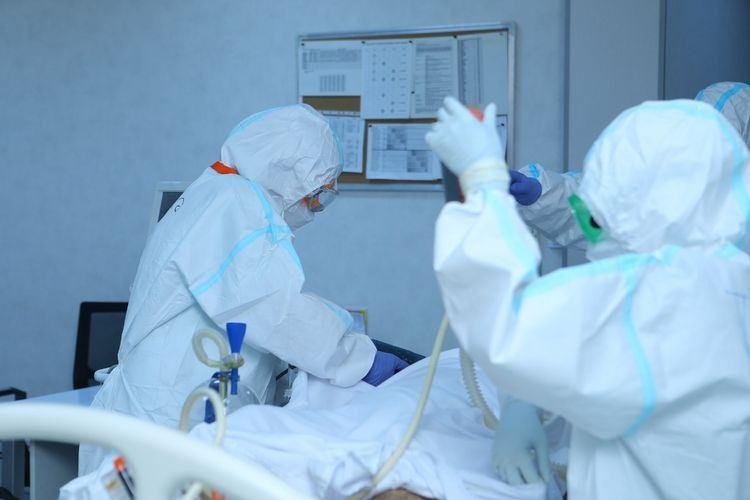Azerbaijan tightens grip on COVID-19 strain detection

By Ayya Lmahamad
A senior health official has said that Azerbaijan has strengthened control over the detection of COVID-19 genetic variants.
The coronavirus infection began to spread faster around the world due to the high contagiousness of the Omicron strain and this strain has been identified in more than 110 countries according to the most recent data, Afag Aliyeva, deputy director-general of the Republican Center for Hygiene and Epidemiology, said.
"In this regard, control over the detection of COVID-19 genetic strains in Azerbaijan has been strengthened," she said.
Aliyeva noted that scientific research has once again shown that vaccination is the most effective way to prevent complications from new and rapidly spreading COVID-19 strains.
"Vaccination has been carried out in Azerbaijan since January 18, 2022, and it is still being carried out successfully. The epidemiological situation in Azerbaijan remains stable due to the active participation of the population in vaccination," she stated.
Growth in number of COVID-19 cases
The deputy director-general emphasized that the number of COVID-19 infection cases is increasing on a daily basis not only in Azerbaijan but also in many European and post-Soviet countries.
She stated that as of January 30, approximately 119,000 new cases of COVID-19 had been registered in Germany, over 121,000 in Russia, approximately 25,000 in Ukraine, and more than 17,500 in Georgia in the previous day.
“In a short period of time, the omicron variant of COVID-19 began to actively spread and, having displaced the delta strain, became dominant," she said.
Aliyeva emphasized that despite a sharp rise in infection cases, the average daily hospitalization rate for people who test positive for COVID-19 remains stable.
"The main reason for this is that those who were vaccinated against the disease if infected, endure it easily," she said.
Booster dose
Speaking about the booster dose of the COVID-19 vaccine, Aliyev underlined that it increases protection against the Omicron strain by 95 percent for people aged 50 years and over.
She noted that protection against coronavirus infection is provided by antibodies formed after vaccination. Aliyeva also added that the booster dose reduces the risk of hospitalization of those infected with the Omicron strain by 88 percent.
"Studies have shown that the incubation period for the new COVID-19 strain is shorter, but the risk of re-infection with Omicron is several times higher than of the Delta variety of coronavirus. It is important to inject a second dose of the vaccine or get vaccinated five months after recovery with a booster dose," she said.
Aliyeva also recalled that according to the decree of the Cabinet of Ministers, the "vaccine certificate" expiring after six months of receiving the second dose of the vaccine will not be valid from February 15.
"In addition, it is necessary to follow the rules of a special quarantine regime, which include social distance, use of masks, and hand hygiene," she said.
Omicron's symptoms
Speaking about the Omicron strain symptoms, she noted that they are often similar to those of acute respiratory infection.
"The new strain mainly affects the upper respiratory tract, the nose and throat, and is less common in the lungs, than other strains of coronavirus infection," she said.
She noted that the most common symptoms of Omicron are headache, runny nose and sore throat.
On February 28, 2020, the country confirmed its first COVID-19 case. On March 25, the country implemented a special quarantine regime and implemented a number of measures to combat COVID-19 in the country.
The nationwide vaccination is free and voluntary, and it is in accordance with the "Vaccination Strategy Against COVID-19 in Azerbaijan for 2021-2022."
The country began vaccinating citizens with China's Sinovac on January 18, AstraZeneca's Vaxzevria vaccine on May 3, Russia's Sputnik V on May 18, and Pfizer from the United States on June 7. From May 10, the country began offering COVID-19 vaccination to citizens over the age of 18.
Simultaneously, on August 9, Azerbaijan began issuing vaccination exemption certificates to citizens who have contraindications to coronavirus vaccines approved for use in the country.
The approved agreement calls for a total of 3,280,000 doses of the COVID-19 vaccine to be delivered to Azerbaijan in 2022.
The total number of vaccines administered in the country as of January 31 is 12,000,767, including 2,028,205 booster doses.
--
Ayya Lmahamad is AzerNews’ staff journalist, follow her on Twitter: @AyyaLmahamad
Follow us on Twitter @AzerNewsAz
Here we are to serve you with news right now. It does not cost much, but worth your attention.
Choose to support open, independent, quality journalism and subscribe on a monthly basis.
By subscribing to our online newspaper, you can have full digital access to all news, analysis, and much more.
You can also follow AzerNEWS on Twitter @AzerNewsAz or Facebook @AzerNewsNewspaper
Thank you!
